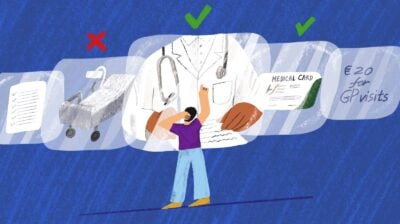Your right to medical consent and confidentiality
Find out about your right to consent and confidentiality when receiving medical treatment.

Giving medical consent means giving permission for surgical or medical treatment. If you are under 16 years of age then your parents or guardian must consent to any surgical or medical treatment you receive. However, you should still be told about the treatment and your views or concerns should be taken into consideration.
If you are over 16, but under 18 years of age, you can consent to surgical and medical treatment. However, some doctors and hospitals may still want to involve your parents or guardians in these decisions, and they will need your consent to do so.
Confidentiality when under 18 years of age
It can be pretty difficult opening up to someone about something personal like your health, so it’s important that you know what you say is confidential. Once you turn 16, in most situations doctors have an ethical responsibility to keep your information confidential.
I am under 18 and my parents won’t give consent for medical treatment that I want or need. What can I do?
For most medical procedures, consent is required before anything can be carried out. Sometimes, a parent might not want to give their consent for a procedure for their child.
If you are 16 or older, in some circumstances you can consent to surgical, medical or dental treatment without needing a parent’s consent.
If you are under 16, a parent’s consent is needed, and there is not much the doctor can do if they refuse to provide it. In extreme cases, the doctor may take the parents to court if they believe the medical procedure is in the best interests of the child or young person.
I am over 16. Can I go on the pill without my parents finding out?
The age of medical consent is set at 16, meaning you can consent to medical treatment without needing to consult your parents.
If you want to start a form of contraception, you can discuss this with your doctor, and in most cases they should be able to respect your confidentiality in having that conversation. They might encourage you to have a conversation with your parents, but they would not be allowed to tell them without your consent.
If the doctor believes you are mature enough to understand all of the relevant information about starting contraception and the risks involved, they may be willing to give it to you.
Before you start, you can ask your doctor if what you say is confidential if you want that reassurance.
Remember, the legal age of sexual consent in Ireland is 17. If you are under 17 and sexually active, your doctor may have concerns, especially if your partner is much older than you. If they feel there is a possibility that you (as a child who is under the age of 18) is being harmed or taken advantage of, they may have a legal obligation to report that.
Can a doctor break confidentiality?
There are a few cases where they may pass on the information you have shared with them to other colleagues or to your family.
These include any concerns that you may harm yourself or others, or if a doctor is concerned that you or another child is being harmed in any way they have an obligation to report their concerns to the Child and Family Agency, Tusla. If you are about to divulge something you want kept confidential it can often help to ask the person whether they can keep what you say confidential. You could even check this by asking in a hypothetical way.
While you are under 18, your parents may also be legally entitled to access your medical history or other information about you.
Confidentiality when over 18 years of age
Once you turn 18, a doctor is obliged to keep everything you tell them confidential unless they are concerned that you may hurt yourself, or others, or if they are concerned that a child is being harmed in any way. In such situations the doctor should discuss this with you first. If you feel uncomfortable or are unsure about confidentiality, ask the doctor or the clinic at the start of your visit whether the information will be confidential or whether your parents will be told. Also ask the doctor if they are obliged to tell anyone else.
For most people talking to a doctor or other health professional about difficult subjects can be embarrassing and stressful. Remember that doctors, nurses and counsellors deal with these things every day, so try not to let it put you off speaking to them.
How do I complain if I feel a doctor broke my confidentiality?
If you want to complain about a breach of confidentiality, or about something else involving your doctor, you can make a complain to the Medical Council of Ireland. Find the details on making a complaint here. If you want to make a complaint about a nurse or another medical professional, you can go to the specific council or board that deals with that profession, such as the Nursing and Midwifery Board of Ireland.
For more information, visit HSE Your Service, Your Say.






